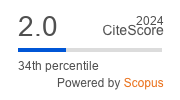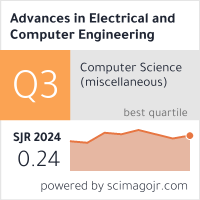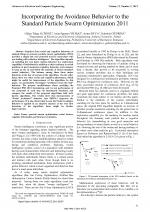| 2/2015 - 7 |
Incorporating the Avoidance Behavior to the Standard Particle Swarm Optimization 2011ALTINOZ, O. T. |
| Extra paper information in |
| Click to see author's profile in |
| Download PDF |
Author keywords
particle swarm optimization, social factors, cognitive informatics, performance evaluation
References keywords
swarm(14), optimization(14), systems(5), evolutionary(5), computation(5)
Blue keywords are present in both the references section and the paper title.
About this article
Date of Publication: 2015-05-31
Volume 15, Issue 2, Year 2015, On page(s): 51 - 58
ISSN: 1582-7445, e-ISSN: 1844-7600
Digital Object Identifier: 10.4316/AECE.2015.02007
Web of Science Accession Number: 000356808900007
SCOPUS ID: 84979834398
Abstract
Inspired from social and cognitive behaviors of animals living as swarms; particle swarm optimization (PSO) provides a simple but very powerful tool for researchers who are dealing with collective intelligence. The algorithm depends on modeling the very basic random behavior (i.e. exploration capability) of individuals in addition to their tendency to revisit positions of good memories (cognitive behavior) and tendency to keep an eye on and follow the majority of swarm members (social behavior). The balance among these three major behaviors is the key of success of the algorithm. On the other hand, there are other social and cognitive phenomena, which might be useful for improvement of the algorithm. In this paper, we particularly investigate avoidance from the bad behavior. We propose modifications about modeling the Standard PSO 2011 formulation, and we test performance of our proposals at each step via benchmark functions, and compare the results of the proposed algorithms with well-known algorithms. Our results show that incorporation of Social Avoidance behavior into SPSO11 improves the performance. It is also shown that in case the Social Avoidance behavior is applied in an adaptive manner at the very first iterations of the algorithm, there might be further improvements. |
| References | | | Cited By |
Web of Science® Times Cited: 8 [View]
View record in Web of Science® [View]
View Related Records® [View]
Updated today
SCOPUS® Times Cited: 10
View record in SCOPUS® [Free preview]
View citations in SCOPUS® [Free preview]
[1] A State of Charge Estimator Based Extended Kalman Filter Using an Electrochemistry-Based Equivalent Circuit Model for Lithium-Ion Batteries, Lai, Xin, Qin, Chao, Gao, Wenkai, Zheng, Yuejiu, Yi, Wei, Applied Sciences, ISSN 2076-3417, Issue 9, Volume 8, 2018.
Digital Object Identifier: 10.3390/app8091592 [CrossRef]
[2] Energy Efficient Control of High Speed IPMSM Drives - A Generalized PSO Approach, GECIC, M., KAPETINA, M., MARCETIC, D., Advances in Electrical and Computer Engineering, ISSN 1582-7445, Issue 1, Volume 16, 2016.
Digital Object Identifier: 10.4316/AECE.2016.01004 [CrossRef] [Full text]
[3] QPSO with avoidance behaviour to solve electromagnetic optimization problems, Duca, Anton, Duca, Laurentiu, Ciuprina, Gabriela, International Journal of Applied Electromagnetics and Mechanics, ISSN 1383-5416, Issue 1, Volume 59, 2019.
Digital Object Identifier: 10.3233/JAE-171170 [CrossRef]
[4] Multi-Objective QPSO Algorithms to Solve an Electromagnetic Benchmark Problem, Mamoc, Cristina, Duca, Anton, Ciuprina, Gabriela, Lup, Aurel-Sorin, 2020 International Symposium on Fundamentals of Electrical Engineering (ISFEE), ISBN 978-1-7281-9038-9, 2020.
Digital Object Identifier: 10.1109/ISFEE51261.2020.9756185 [CrossRef]
[5] Quantum-behaved PSO with neighborhood strategies for solving NDET inverse problems, Duca, Laurentiu-Cristian, Ioan, Daniel, Popescu, Cornel, 2017 10th International Symposium on Advanced Topics in Electrical Engineering (ATEE), ISBN 978-1-5090-5160-1, 2017.
Digital Object Identifier: 10.1109/ATEE.2017.7905178 [CrossRef]
[6] Multiphase System of Coils as Illustrated by Magnetotherapy, Syrek, Przemyslaw, Skowron, Mikolaj, Ciesla, Antoni, 2019 11th International Symposium on Advanced Topics in Electrical Engineering (ATEE), ISBN 978-1-7281-0101-9, 2019.
Digital Object Identifier: 10.1109/ATEE.2019.8724931 [CrossRef]
Disclaimer: All information displayed above was retrieved by using remote connections to respective databases. For the best user experience, we update all data by using background processes, and use caches in order to reduce the load on the servers we retrieve the information from. As we have no control on the availability of the database servers and sometimes the Internet connectivity may be affected, we do not guarantee the information is correct or complete. For the most accurate data, please always consult the database sites directly. Some external links require authentication or an institutional subscription.
Web of Science® is a registered trademark of Clarivate Analytics, Scopus® is a registered trademark of Elsevier B.V., other product names, company names, brand names, trademarks and logos are the property of their respective owners.
Faculty of Electrical Engineering and Computer Science
Stefan cel Mare University of Suceava, Romania
All rights reserved: Advances in Electrical and Computer Engineering is a registered trademark of the Stefan cel Mare University of Suceava. No part of this publication may be reproduced, stored in a retrieval system, photocopied, recorded or archived, without the written permission from the Editor. When authors submit their papers for publication, they agree that the copyright for their article be transferred to the Faculty of Electrical Engineering and Computer Science, Stefan cel Mare University of Suceava, Romania, if and only if the articles are accepted for publication. The copyright covers the exclusive rights to reproduce and distribute the article, including reprints and translations.
Permission for other use: The copyright owner's consent does not extend to copying for general distribution, for promotion, for creating new works, or for resale. Specific written permission must be obtained from the Editor for such copying. Direct linking to files hosted on this website is strictly prohibited.
Disclaimer: Whilst every effort is made by the publishers and editorial board to see that no inaccurate or misleading data, opinions or statements appear in this journal, they wish to make it clear that all information and opinions formulated in the articles, as well as linguistic accuracy, are the sole responsibility of the author.



